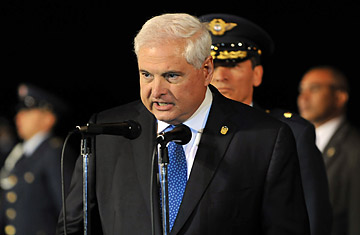
Panamanian President Ricardo Martinelli upon his arrival at Catam Air Base in Bogota, on August 6, 2010.
When supermarket tycoon Ricardo Martinelli was running for president of Panama in 2009, he cleverly embraced the nickname his critics had given him — el loco (the crazy man) — and spun it into a campaign slogan: "We crazies are the majority!" By claiming ownership, Martinelli disarmed some of the less than flattering stories about his temperament and was swept into office with a convincing 60% of the vote.
But a year-and-a-half after Martinelli took office with promises to make Panama a first-world country, critics claim el loco is living up to his billing. Opponents claim the grocer-turned-president is becoming increasingly authoritarian and arbitrary. His alleged abuse of the separation of powers, disregard for labor rights and the environment, and intolerance toward protest have some analysts wondering if Panama's young democracy is sliding back toward its strongman past.
The president's management style was evident with the passage of a controversial reform to the labor code that included a slew of other legislative odds and ends — an over-stuffed document that was appropriately dubbed "The Sausage Law." At Martinelli's direction, the bill, which was packaged as a measure to develop commercial aviation, was rammed through the congressional sausage grinder without any serious debate during an extraordinary weekend session held last June while the rest of the country was distracted by the World Cup. Confusion and labor unrest followed the ratification, leading to a 10-day labor strike by banana workers in the western border region of Changuinola who feared it would limit their right to organize in unions, bargain collectively and protest. Police clashed violently with the mostly indigenous banana workers, leaving at least two dead and more than 100 injured.
"After the elections, Martinelli started to show his claws," says Mitchell Doens, secretary-general of the opposition Democratic Revolutionary Party (PRD). "He thinks he can run the country like he runs a supermarket. But it's one thing to govern a country, and it's another thing to order people around in a supermarket." The criticism is ironic because the PRD produced anti-democratic military leaders Gen. Omar Torrijos and Gen. Manuel Noriega. But, says Doens, Martinelli is like Noriega because he "doesn't respect constitutional guarantees and doesn't respect the rules of democracy.
According to political analyst Arturo Cruz, a professor of politics at Latin America's INCAE Business School, the Panamanian president's "authoritarian tendencies" in politics are consistent with his behavior in the private sector. "This is a man of great wealth who was ruthless in business and then created his own successful political party. He has an incredible sense of self and believes he can get away with anything he wants." Heather Berkman, a political risk analyst for the Washington, D.C.-based Eurasia Group, says Martinelli's supermarket-style of "mercurial micromanagement " has made him a wildcard in government. "The strong influence that Martinelli's personality has on policymaking contributes to a level of uncertainty regarding decisionmaking."
A Panamanian of Italian descent, the U.S.-educated Martinelli is the owner of Panama's Super 99 supermarket chain and several other successful businesses. Though he held two government posts under previous administrations, he was viewed as a political outsider when he ran for president in 2009 on the ticket of the Democratic Change party, which he organized in 1998 to run for the presidency. Critics say he has used his office and a campaign to curb corruption to go after his political enemies. They accuse his government of tapping phone lines and detaining activists without due cause. Press freedom watchdogs have criticized Martinelli's government for cracking down on freedom of expression by threatening and attacking reporters, both verbally and physically.
Critics say that Martinelli's strong-arm policies have deep roots in history. Despite Panama's robust economy (which has a bit of a first-world glimmer), the political system is still stuck with third world habits. "This government is very tropical," says leftist activist and university economics professor Juan Jovane. "And you can't become a first world country without democracy."
Yet Martinelli seems to respond to pressure — both internal and external. Harsh international criticism led the president to suspend the labor reform law and negotiate with union leaders and other sectors. As a result of those talks, Martinelli announced Oct. 11 that his government will scrap the "Sausage Law" and replace it with six less objectionable bills. Meanwhile, after news that his approval rating had dropped 40 points over the last year, he is apparently trying out a kinder and gentler approach to having his way. For example, on Oct. 6, he pardoned two TV journalists who were sentenced to a year in jail for defaming an ex-government official.
Congressman Hugo Moreno, a leader of the Panamenista Party allied with the president's ruling coalition, says that Martinelli has on "various occasions" invited other politicians to a working breakfast to exchange ideas and consult on various projects. Moreno says Martinelli's decisions don't always seem to reflect those breakfast consultations, but says "That's why we pay him to be president."
The business sector also defends Martinelli — even if in relative terms. Armel Gonzalez, a Nicaraguan land developer who left his native country in 2007 after Sandinista officials allegedly tried to extort $4 million from one of his projects, says doing business in Panama is easy by comparison. "The problem in Latin American countries is there is a lot of disorder and abuse. So when a leader comes along and imposes order, the criticism begins automatically. But he's doing an excellent job," says Gonzalez.
Doing an excellent job by Nicaraguan standards, however, may not be the threshhold Panamanians expected Martinelli to aim for. Since voting el loco into office, most of Panama now has a lower tolerance for political craziness.
